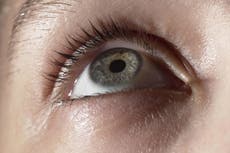Hay fever may be mistaken for Covid, warns expert
Hay fever is an allergic reaction to pollen
Hay fever sufferers may be mistaking their symptoms for Covid, an expert has warned.
Symptoms of hay fever include sneezing, coughing, having a runny or blocked nose, drowsiness, and itchy, red or watery eyes.
Though Covid infection rates are nowhere near as high as when social distancing measures were enforced, the virus is still circulating – and pharmacists are urging Britons to keep this in mind as the country enters hay fever season.
Irish pharmacist Laura Downling, also known as the Fabulous Pharmacist, is concerned that some might be mistaking hay fever for Covid.
“People that have suffered from hay fever in previous years will probably understand the symptoms - but you can get hay fever at any stage in your life,” she told Late Breakfast with Claire McKenna.
“So, I suppose it’s those people who might get it for the first time ever that might wonder, ‘What are these symptoms?’”
Ms Dowling said that tree pollen, grass pollen, weed pollen – which all emerge at different points in the year – could trigger a bout of hay fever.

“The tree pollen is more during the spring, grass pollen is late spring/early summer and then the weed pollen is early autumn,” she explained.
“Those things can trigger an allergic response in our nose, in our eyes and that’s what causes the itchy eyes, the streamy eyes, the sneezing.”
Millions of Britons are affected by hay fever, with many relying on antihistamine drops, tablets or nasal sprays to ease their symptoms.
Simple ways to keep the symptoms at bay include smearing Vaseline around your nostrils to trap pollen or wearing wraparound sunglasses to stop pollen from getting into your eyes.
Other tips include showering and changing your clothes after you have been outside and vacuuming regularly.
Most can manage their hay fever with a quick trip to the pharmacy, but the NHS advises that you seek advice from a GP if your symptoms get worse or do not improve after taking medicine.
For more information on treating hay fever, see the NHS’ dedicated webpage. And you can check the pollen forecast on the Met Office website here.
Check if you have hay fever
According to the NHS, symptoms of hay fever include:
- sneezing and coughing
- a runny or blocked nose
- itchy, red or watery eyes
- itchy throat, mouth, nose and ears
- loss of smell
- pain around your temples and forehead
- headache
- earache
- feeling tired
If you have asthma, you might also:
- have a tight feeling in your chest
- be short of breath
- wheeze and cough
Hay fever will last for weeks or months, unlike a cold, which usually goes away after 1 to 2 weeks.
Join our commenting forum
Join thought-provoking conversations, follow other Independent readers and see their replies
Comments


Bookmark popover
Removed from bookmarks